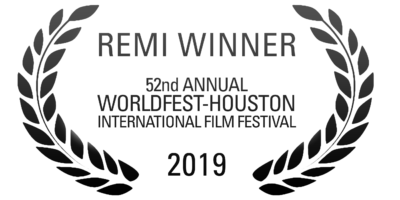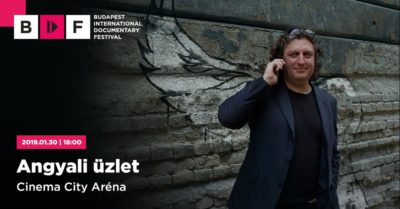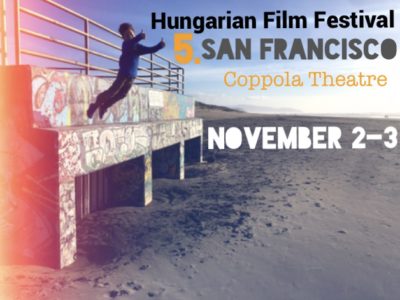Director, cinematographer, producer
Zsuzsanna Gellér-Varga
Music composer, story editor
Balázs Wizner
Editor
Judit Feszt
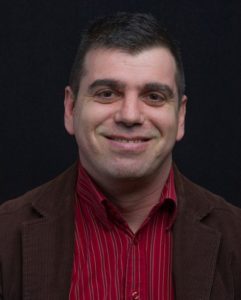 BALÁZS WIZNER sociologist, documentary filmmaker, composer. He was a researcher at the Sociology Institute of the Hungarian Science Academy. As the managing director of Metaforum Film Studio he had produced documentaries and public service advertisements. Currently he is working as a video journalist for AFP and as a videographer for the United States Holocaust Memorial Museum. Apart from directing and producing he composes music for theater performances and documentary films.
BALÁZS WIZNER sociologist, documentary filmmaker, composer. He was a researcher at the Sociology Institute of the Hungarian Science Academy. As the managing director of Metaforum Film Studio he had produced documentaries and public service advertisements. Currently he is working as a video journalist for AFP and as a videographer for the United States Holocaust Memorial Museum. Apart from directing and producing he composes music for theater performances and documentary films.
Selected films:
2012 Bosnia, Bosnia! (co-director/story editor, director: Gábor Péter Németh)
2012 Rocking the Nation (story editor, director: Borbála Kriza)
2005 Once They Were Neighbours (producer, director: Zsuzsanna Gellér-Varga)
Selected film music:
2018 Angel Business (director: Zsuzsanna Gellér-Varga)
2014 With Love, Jane (Jane Haining) (director: Gyula Krisztián Kormos)
2014 Portraits for the Victims of Communism Memorial Foundation (director: Réka Pigniczky)
2011 Kult_ur.hu – a documentary about György Aczél (director: Gyula Krisztián Kormos )
2006 Synagogue For Sale (director: Zsuzsanna Gellér-Varga)
2005 Once They Were Neighbours (director: Zsuzsanna Gellér-Varga)
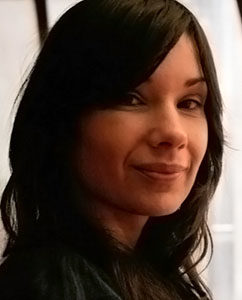 JUDIT FESZT after finishing her studies in the School of Arts and Crafts in Spain, Granada worked as graphic designer and created various experimental short movies. Tile Mail, a documentary as co-director earned her the Best Documentary Award at the Hungarian Film Week in 2009. Since that she has participated in several documentaries, commercials and corporate movies as editor.
JUDIT FESZT after finishing her studies in the School of Arts and Crafts in Spain, Granada worked as graphic designer and created various experimental short movies. Tile Mail, a documentary as co-director earned her the Best Documentary Award at the Hungarian Film Week in 2009. Since that she has participated in several documentaries, commercials and corporate movies as editor.
Selected works:
Carta Azulejo / Tile Mail – short documentary, director, editor – Duna Műhely 2008
Yad Hanna – The Collective Man – documentary, editor – Duna Műhely 2009
Eszembe jutottál – Főhajtás Cseh Tamás előtt – concert movie, editor – Duna TV 2010
Wonderful Gladiators – creative documentary, editor – HBO, New Angle Film 2011
Villa Forma – commercial, editor – Color Production – Brazil 2011
SANOFI – Nospa – corporate film, editor – Filmpartners 2012
Rickshaw Rush – documentary, editor – Duna Műhely 2012
MKB Bank – Korda Studio – multi screen presentation, editor – Filmpartners 2012
Trans River I-II – documentary, editor – Filmpartners 2015
Awards:
Best Documentary – Hungarian Film Week – Budapest, Hungary
Main Prize – International Super 8 Festival – Szeged, Hungary
Golden Dear prize, student prize – Dialektus – Budapest, Hungary
Main Prize – Alter Native – Tirgu Mures, Romania
Main Prize in experimental category, student price – Film.dok – Miercurea Ciuc, Romania
Best experimental documentary of the year – Critics’ Award – Budapest, Hungary
Best documentary film of 2013 – Hungarian Film Festival of Los Angeles – USA
Angel Business – final credits
We are deeply grateful to our protagonists for sharing their lives with us.
Featuring
Antal Károlyi
András Perényi
Bence Károlyi
Judit Oláh
Mili Károlyi
Zsófia Major
János Perényi
Judit Dombóvári
Csilla Dr. Vajdáné Kutas
Children at ELTE Special Methodology Pre-School
Erzsébet Simonyi
Viktor Déri
Viktória Rába
János Wisinger
Márk Kubatov
Péter Kádas
Viktória Miló
Ágnes Kurucz
István Károlyi
Istvánné Károlyi
Balázs Czotter
director, cinematographer, producer
Zsuzsanna Gellér-Varga
music composer, story editor
Balázs Wizner
additional camera
András Perényi
Andrea Miklós
Arun Battharai
Balázs Czotter
Dorottya Zurbó
Péter Krajcsovics
Tatiane Thompson
drone recording
Drone Media Studio
editor
Judit Feszt
sound post-production
Rudolf Várhegyi H.A.E.S.
Tamás Kreiner
colorist
Balázs Gotthárdi
post-production
4Cut Studio

story consultant
Éva Schulze
György Pálos
graphics
Bianka Parázs
Tamás Czuder
vfx
Árpád Hermán
interview transcriptions
Ágnes Varga
Andrea Hernádvölgyi
Ibolya Laki
translation
Réka Pigniczky
music recording-music producer
Chris Allan Tod
musicians
Ádám Móser – accordion
Balázs Wizner – trumpet, flugelhorn
Béla Ágoston – clarinet, tenor saxophone
János Mazura – tuba
Title song (“New bossa”) composer: Miklós Marton, instrumentation: Balázs Wizner
Link Band participated in the song “Florida”
Special thanks
Ágnes Frehr
Ágnes Hűvös (Megoldás Most)
András Muhi
Anna Kis
Attila Kékesi
Barnabás Málnay (MM Klaszter)
Beáta Tóth-Makra
Bojána Papp
Bori Kriza
Chris Brown
Dorota Roszkowska
Eszter Nordin
Éva Vajda
Gábor Dehelán (The Hub)
Gábor Péter Németh
Gábor Zsigmond Papp
György Martin Hajdú (Central-European Broker Educational Foundation)
Helga Progl
Ildikó Földes
Ildikó Szűcs, Dr.
Ilona Gaal
Imre Hild (iCatapult)
János Gellér
Janto Indrarto (Kazimir)
Jeremy Braverman
Karen Everett
Katalin Rosta (ELTE Special Methodology Pre-School)
Krisztián Vranik (Anker Klub)
Krisztina Meggyes
László Molnár (Drone Media Studio)
Leena Pasanen
Levente Pap
Levente Zsembery
Marianna Szabó (Central-European Broker Educational Foundation)
Márta Varga
Matthew Brunwasser
Misi and Samu Gellér
Moniek Wester-Keegstra
Mónika Safranka (iCatapult)
Paul Powells
Richárd Gellai (Megoldás Most)
Rita Balogh
Róbert Nagy, Dr.
Sára László
Sedika Mojadidi
Stefano Tealdi
Szabolcs Győrffy
Tamás Almási
Tamás Turcsán
Tom Ernst
Veronika Tomka
Xackery Irving
Zoltán Békés (Mr. Sale)
Zoltán Bruckner (iCatapult)
the Hungarian startup community
Supporters
Ágnes Kaposi
Bea Bedő
Csaba Zajdó
Gábor Kaposi
Giséle Kertai
Jason Regier
Kelly St.John Regier
Kelly Tran
Matt Needham
Péter Somosi
Péter Varga
Sara Needham
Sutapa Choudhury
Tamás Kertai
Tamás Otrok
Teodóra Bodó
Tibor Mózes
Zoltán Somogyi
Zsuzsi Somosi
Special supporters
Central-European Broker Educational Foundation

Ildikó Balogh
Viktor Szathmáry
Zoltán Schäffer
© 2019 Zsurló Film Ltd
The filmmakers like to express their gratitude to their further contributors who supported the film’s post-production through the INDIEGOGO campaign:
(Hungarian names are in Family name, Surname order)
Anne Senges, Ariel Ducey, Bárdos Kristóf, Biró Nurila, Borissza Kitti, Czuder Tamás, Daniel Abel, Deborah Hoffmann, Dehelán Gábor, Dimity Gábor Borisz, Eichner Hanna, Elekes Ferenc, Farkas Zsolt, Fehérgyarmati-Tóth Károly, Ferenc Raj, Fogaras Dániel, Gall Cecilia, Gürtler Szilvia, György Anna, Halász Róbert, Harman Hoetink, Hegyes Katalin, Heidi Gronauer, Horgos Lénárd, Hugh Purcell, Huszák Loretta, Józsa László, Kádas Péter, Kaprinay Zoltán, Karafiáth Balázs László, Károlyi Antal, Károlyi Gergely, Klein Gábor, Klein Judit, Klein Sándor, Klein Ágnes, Kondor András, Kondor Judit, Langmár Péter, Leitner Zoltán, Lévai Balázs, Lévai Gábor, Lise Pieters, Loránd Imre, Lucija Stojevic, Major Zsófia, Málnay Barnabás, Manuela Maiguashca, Markó Alexandra, Molnár Gábor, Moniek Keegstra, Nádudvari Zoltán, Nagy Andrea, Nagy Dellemann Erika, Német G. Dániel, Nordin Eszter, Oksana Sarkisova, Orbán Sándor, Orbán Ágnes, Pátrovics Levente, Peter Klein, Pigniczky Réka, Progl Helga, Rajna Györgyi, Révész Judit, Rod Freedman, Roi Frey, Sajó András, Sallay András, Sara Maamouri, Schleer Tamás, Sessler Zoltán, Somosi Péter, Stacy Thompson, Szabó Márton, Szarvas Olivér, Szász György, Szemere Katalin, Szigeti Zsuzsanna, Tar-Ballai Éva, Tóth-Makra Beáta, Várfi Melinda, Varga Ágnes, Verő Mihály, Wohlmuth Máté, Záray Szilvia, Zubonyai Zoltán,
and for all those who supported the film anonymously

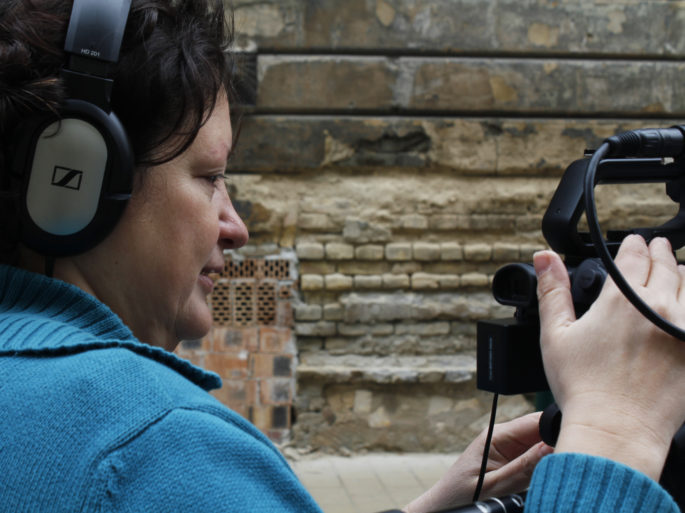
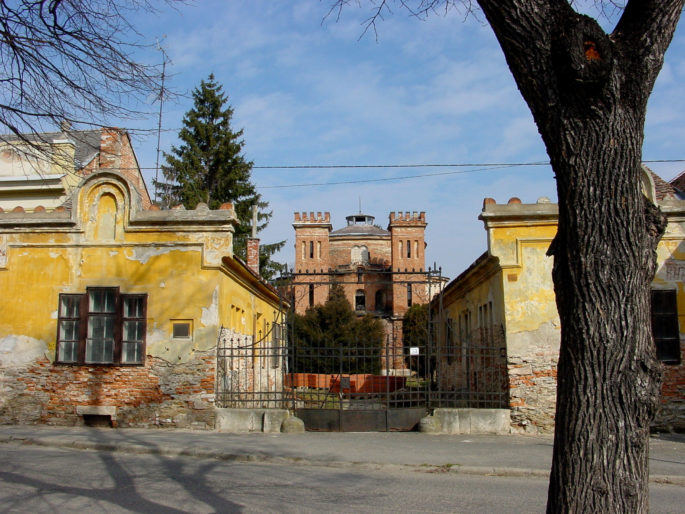
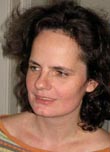 ILONA GAAL (interviews, script) currently works as a journalist and editor at the Hungarian National Radio. After obtaining her degree in sociology and economy she published articles at Figyelő (economic weekly), at hvg.hu (online economic portal), and Magyar Narancs (political and current affairs weekly). She worked as the deputy editor in chief at “manager magazin” for 2 years. She wrote an investigative report about the story of the documentary “Synagogue for Sale” for “manager magazine”.
ILONA GAAL (interviews, script) currently works as a journalist and editor at the Hungarian National Radio. After obtaining her degree in sociology and economy she published articles at Figyelő (economic weekly), at hvg.hu (online economic portal), and Magyar Narancs (political and current affairs weekly). She worked as the deputy editor in chief at “manager magazin” for 2 years. She wrote an investigative report about the story of the documentary “Synagogue for Sale” for “manager magazine”.
 BALÁZS WIZNER
BALÁZS WIZNER LÁSZLÓ HARGITTAI (editor) is the founder and co-owner of
LÁSZLÓ HARGITTAI (editor) is the founder and co-owner of








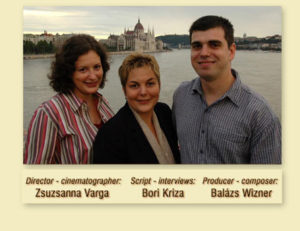


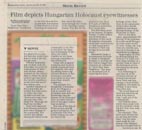


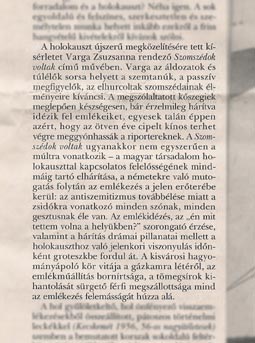


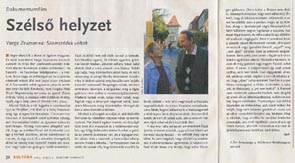
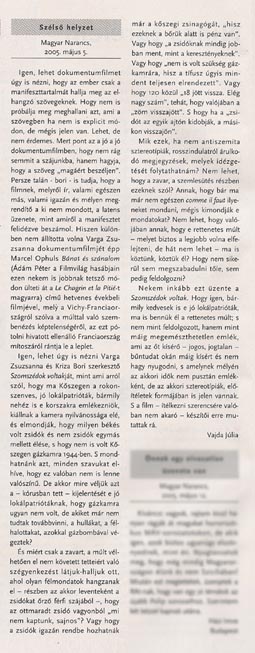

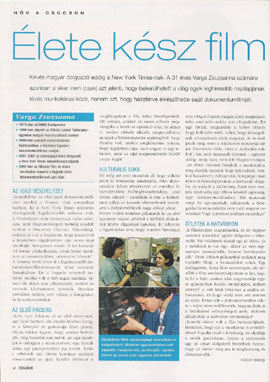

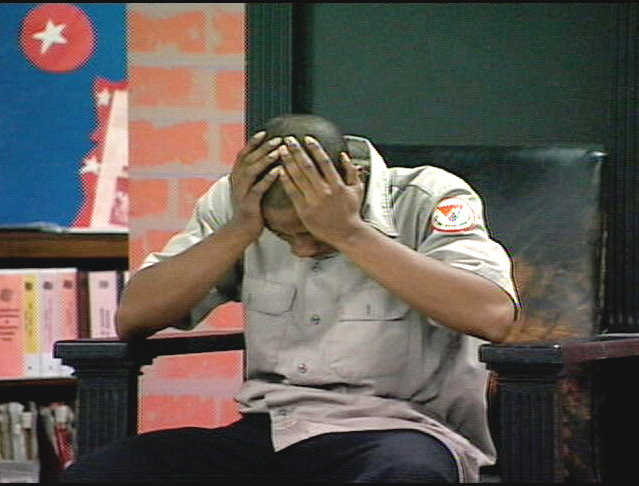


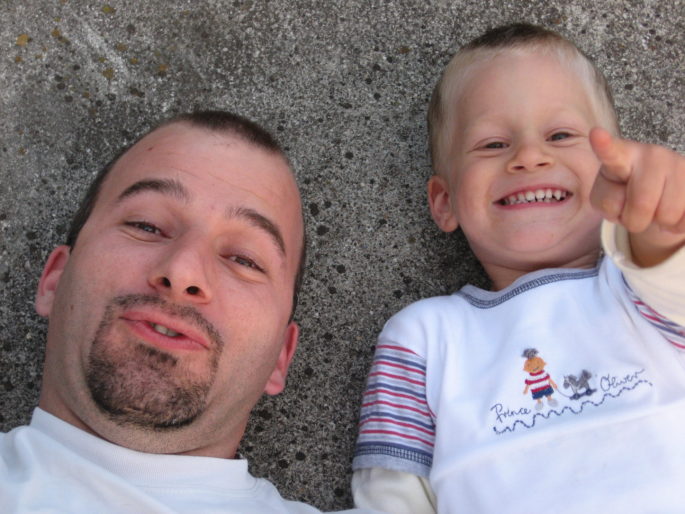

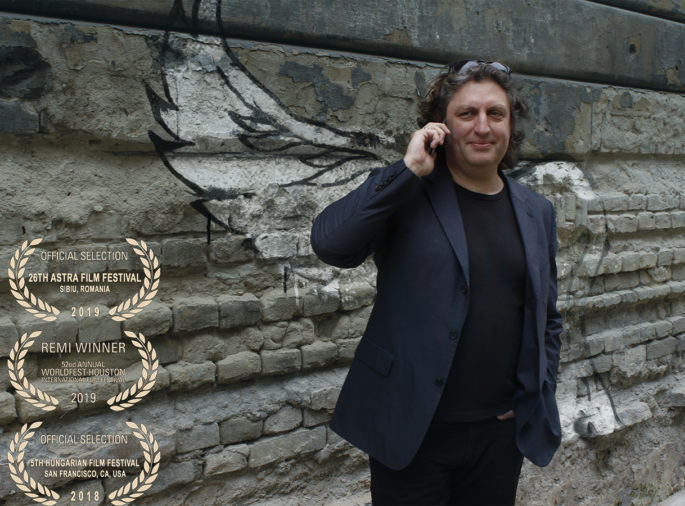
 BALÁZS WIZNER
BALÁZS WIZNER JUDIT FESZT after finishing her studies in the School of Arts and Crafts in Spain, Granada worked as graphic designer and created various experimental short movies. Tile Mail, a documentary as co-director earned her the Best Documentary Award at the Hungarian Film Week in 2009. Since that she has participated in several documentaries, commercials and corporate movies as editor.
JUDIT FESZT after finishing her studies in the School of Arts and Crafts in Spain, Granada worked as graphic designer and created various experimental short movies. Tile Mail, a documentary as co-director earned her the Best Documentary Award at the Hungarian Film Week in 2009. Since that she has participated in several documentaries, commercials and corporate movies as editor.











